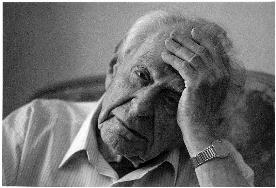
Austrian-born British philosopher; opponent of application of grand social theories to political practice, which he held would inevitably lead to totalitarianism, Popper is noted for his proposition that any theory must be capable of falsification if it is to be accepted as a valid theory; an opponent of the Logical Positivism for which his hometown of Vienna is famous, Popper developed the concept of “Objective Knowledge”, socially transmitted through institutions, practices and social experience as the foundation of knowledge, as opposed to the individualistic approach of many others concerned with the problems of epistemology and the methodology of science.
Educated at the University of Vienna, Popper emigrated to New Zealand in 1937, teaching at the University of New Zealand in Christchurch and then to England in 1945, where he was granted British citizenship and lived for the remainder of his life. He lectured in Philosophy at University College Cambridge (1937-45) and in 1969 was appointed an Emeritus Professor at the London School of Economics. He has held a variety of positions and lectured at Universities throughout Europe and America.
Popper’s 1945 The Open Society and its Enemies launched scathing attacks on totalitarian ideology of both Left (in the first volume) and Right (in the second volume published later), and succeeded in making enemies for him in just about every direction. Nevertheless, over time, his insistence that social problems are best solved by piecemeal social engineering rather than grand world-transforming crusades, came to descriptive of what most people were doing, and he gained a wider audience from the early 1960s.
Popper wrote extensively on the history and philosophy of science, his Objective Knowledge: An Evolutionary Approach, published in 1972 popularised the concept of “falsifiability” as a criterion of validity of a theory, and developed an epistemology which endeavoured to overcome the subjectivism of the dominant Logical Positivist currents.
See an excerpt from his 1966 Objective Knowledge.


 5:57 PM
5:57 PM
 OGB community
OGB community












0 comments:
Post a Comment